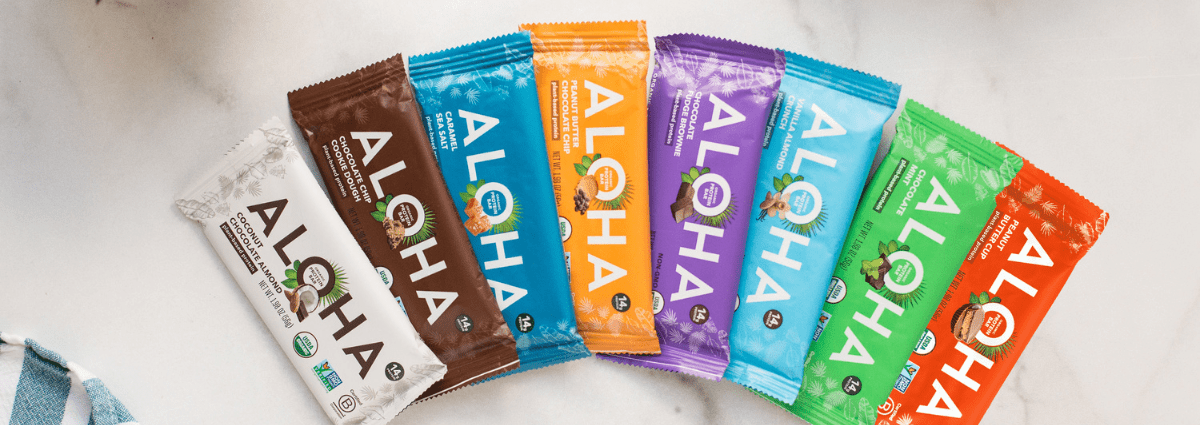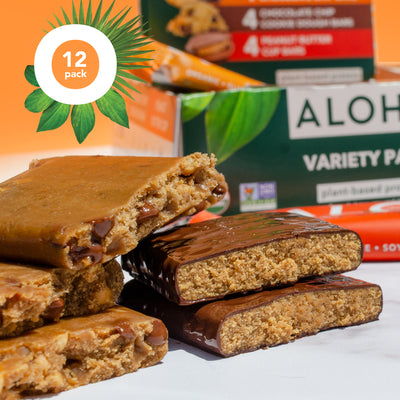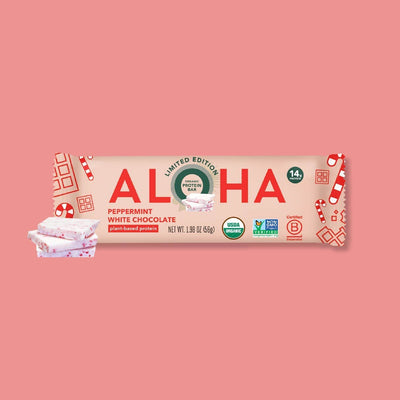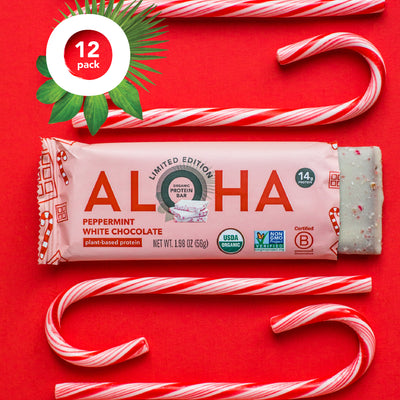Key Takeaways
1. Timing Matters: Consuming a protein bar pre-exercise can boost your energy, while post-workout can accelerate muscle recovery.
2. Supplement, Not Substitute: Protein bars are best used to supplement protein intake and should be balanced with a diet rich in whole foods.
3. Quality Over Quantity: When choosing a protein bar, prioritize those with quality protein sources and a balanced macronutrient profile.
Protein is a powerhouse nutrient for anyone active in the fitness world. Like the reliable rhythm of a heartbeat, protein provides the essential beat for muscle recovery, growth, and overall wellness. They're not just a convenient snack; they're a strategic tool to help you meet your workout milestones.
Keep it clean, keep it healthy. ALOHA's protein bars are your trusty snack for every fitness challenge.
What Are Protein Bars?
Protein bars are small, nutrient-packed snacks made for people who want a quick way to get protein. They're useful for curbing hunger, boosting energy, and adding to your diet. Mainly made of protein, they also have carbs, fats, fiber, vitamins, and minerals. They come in different flavors and textures to suit different diets and needs. Whether you're into fitness or just busy, protein bars are a handy way to stay healthy and active.
Elevate Your Nutrition Game With ALOHA
Ready to fuel your active lifestyle? Find your ideal protein bar match with ALOHA, where nutrition meets convenience. |
Can Protein Bars Replace Meals?
Protein bars are handy for when you're on the move, but they aren't designed to completely take the place of meals made from whole foods. Sometimes, a protein bar can fill in for a meal, especially since it has a mix of nutrients. But it's important to remember that eating a variety of natural foods gives you many essential micronutrients and dietary fiber that might not be in protein bars.
For keeping up good health and nutrition over time, it's better to use protein bars as an addition to a diet that's rich in different natural foods, rather than relying on them as your main food source. The key is to balance convenience with getting the right nutrients.

Benefits Of Protein Bars For Workout Goals
Pre-Workout Energy
A protein bar can serve as your pre-exercise fuel, offering a blend of carbohydrates for immediate energy and fats for longer-lasting fuel. By consuming a balanced snack before engaging in physical activity, your body has the necessary resources for optimal performance.
The glycemic index of the carbs in the bar should be considered—lower for sustained energy or higher for a quick burst. Protein also plays a role here, contributing to a more balanced energy release and preparing muscles for the exertion ahead. Keep in mind that the goal is not just to power through a workout, but to do so effectively and with endurance.
Muscle Support And Growth
Protein is a critical macronutrient for muscle repair and growth, and protein bars can be a convenient source of this nutrient post-exercise. Consumption of protein shortly after working out provides your muscles with the amino acids needed to begin the repair process.1 A high-quality protein bar can initiate the recovery phase faster through its easy digestibility and quick absorption.
When Is The Best Time To Eat Protein Bars?
Eating protein bars at the right times can help you get the most out of them, whether it's for energy, muscle recovery, or as a snack.
For Energy
Eating a protein bar before you need a lot of energy, like before a workout or a busy part of your day, can be helpful. The carbs in the bar give you a quick energy boost, and the fats provide longer-lasting energy. Matching the time you eat the bar with when you need energy can be useful.
After Workouts
Eating a protein bar after working out can help your muscles recover. It's particularly useful if you do resistance training or long cardio sessions. The protein in the bar helps repair muscles, which can make you feel less sore and ready for your next workout.
As a Snack or Part of a Meal
Protein bars can be good snacks or part of a meal to keep your energy up and stop you from feeling too hungry between meals. They can help you reach your daily protein needs but remember to balance them with other foods to get a variety of nutrients. Eating them should complement your regular meals, not replace them.
Integrating Protein Bars Into A Healthy Diet
As A Supplement, Not A Staple
While protein bars are convenient, they should not become the foundation of your diet. Use them strategically to supplement your protein intake, particularly when whole food sources aren't available.
Consider them as a handy tool in your nutritional toolkit, not the sole resource. This approach ensures that while you enjoy the practicality protein bars offer, you don't miss out on the benefits of fresh, whole foods.
Balance With Whole Foods
Maintaining balance in your diet means using protein bars in harmony with whole foods. These bars work best when they enhance an already nutrient-dense diet rich in vegetables, fruits, whole grains, and lean proteins. They can swiftly fill protein gaps, but they should not push out the irreplaceable micronutrients and antioxidants that whole foods provide.
A balanced approach like this supports overall health, helping to ensure that you're not only meeting your fitness goals but also supporting your body's broader nutritional needs. It's about integration, not substitution, as the cornerstone of a healthy diet.
Mindfulness Of Dietary Needs
When adding protein bars to your diet, it's essential to choose products that align with your specific nutritional requirements. This means considering not just calorie content, but also the presence of allergens, artificial sweeteners, or ingredients that may not fit into your dietary lifestyle.
Whether you're following a low-carb, high-fiber, or sugar-conscious diet, there's likely a protein bar that suits your needs. In selecting the right bar, you honor your body's unique health requirements while still enjoying the convenience and benefits protein bars offer.
Debunking Myths About Protein Bars
Not All Bars Are Created Equal
Dispelling the myth that all protein bars are inherently healthful is essential. Some bars may be packed with sugars and fillers, offering little nutritional benefit. It's important to look beyond the marketing and examine the ingredient list and nutritional facts closely.
A truly healthy protein bar will offer a clean, simple ingredient list, and a nutritional profile that supports your goals.
Not Just For Athletes
Another myth is that protein bars are solely for athletes or those heavily involved in physical activity. While they're certainly useful for those groups, protein bars can benefit anyone looking for a nutritious protein source, especially when time or access to whole foods is limited.
They're a tool for convenience and nutrition for everyone from busy parents to students and professionals. However, just as an athlete would, it's important for everyone to choose protein bars that align with their overall health and dietary goals.
More Protein Isn't Always Better
The notion that the more protein a bar contains, the better it is for you is not always true. Excessive protein intake is not only unnecessary for most people but can also lead to potential digestive issues or kidney strain.
Balance is key—seek bars with enough protein to meet your needs but avoid going to extremes. Remember, the goal is to supplement your diet, not to overload on one particular nutrient. A protein bar should fit within a balanced nutritional plan, providing an appropriate portion of your daily protein requirement.
How To Choose The Right Protein Bar?
Look For Quality Protein Sources
When it comes to the protein in your bar, quality matters just as much as quantity. Aim for bars that use complete protein sources, like ALOHA. Ideal protein bars should cater to your fitness level, dietary preferences, and health goals, whether that's muscle gain, weight loss, or maintenance.

Check For Nutritional Balance
A well-constructed protein bar offers a balance between protein, fats, and carbohydrates, as well as a good dose of dietary fiber. It should suit your dietary needs and support your health goals, such as providing necessary energy or supporting weight loss.
Avoid bars with excessive amounts of sugar or unhealthy fats, which can negate the benefits of the protein content. Examine the label for a macronutrient profile that complements your diet rather than contradicts it. A balanced bar will fuel your body adequately for both your daily activities and your workout regimen.
Consider Your Dietary Restrictions
ALOHA understands the importance of catering to various dietary restrictions and preferences. Whether you follow a vegan, gluten-free, or non-GMO diet, it's crucial to select a protein bar that aligns with these requirements. A good protein bar respects your health choices and supports your active lifestyle without compromise. It should not only fit into your diet seamlessly but also uphold the standards and values you set for your nutrition. Your protein bar should work for you, accommodating your unique dietary needs while providing the nutrition you desire.
Final Thoughts
Protein bars have woven their way into the tapestry of healthful eating, providing a versatile and convenient way to support an active lifestyle. They are not a one-size-fits-all solution but rather a flexible option to be tailored to your individual fitness and dietary goals. With so many choices on the market, it's worth taking the time to select bars that offer the best in nutrition and taste while fitting into your healthful living plan.
For those focused on quality ingredients and simplicity in their protein bars, ALOHA offers options designed with your wellness in mind.
Frequently Asked Questions
Are there any specific considerations for choosing the best healthy protein bars for specific dietary needs or allergies?
Yes, look for bars that align with your dietary restrictions or needs, such as gluten-free, dairy-free, vegan, soy-free options. Reviewing labels for allergen information is crucial.
How do healthy protein bars taste compared to regular protein bars?
Healthy protein bars aim for a balance between taste and nutrition, typically focusing on natural flavors and ingredients, often with a similar taste to regular protein bars.
Do healthy protein bars contain added sugars or artificial ingredients?
Healthy protein bars generally aim to minimize added sugars and artificial ingredients. Reading labels can help identify bars with fewer additives.
What is the ideal time to consume healthy protein bars for maximum effectiveness?
Healthy protein bars can be consumed at various times, including pre or post-workout, as a morning or afternoon snack, or when hunger strikes, based on personal preference and fitness goals.
Can healthy protein bars be used as a convenient on-the-go snack?
Absolutely, healthy protein bars are designed for convenience and are ideal on-the-go snacks due to their portability and balanced nutrition.
Are there any specific considerations for storing or preserving healthy protein bars?
Storing healthy protein bars in a cool, dry place, and following the manufacturer's storage instructions ensures their freshness and quality.
What are the main purposes or intended uses of healthy protein bars in a diet or fitness routine?
Healthy protein bars serve as convenient sources of protein and energy, aiding muscle recovery, satiety, and supporting active lifestyles or workouts.
Do healthy protein bars contain allergens such as nuts, soy, gluten, or dairy?
Some healthy protein bars may contain common allergens like nuts, soy, gluten, or dairy. Reviewing labels for allergen information is essential for those with allergies.
Are there any side effects or risks associated with consuming healthy protein bars?
While generally safe, consuming excessive protein bars or those with certain ingredients may lead to digestive discomfort or unwanted calorie intake. Moderation is advised.
Sources:
1. Weinert DJ. Nutrition and muscle protein synthesis: a descriptive review. J Can Chiropr Assoc. 2009 Aug;53(3):186-93. PMID: 19714233; PMCID: PMC2732256.









